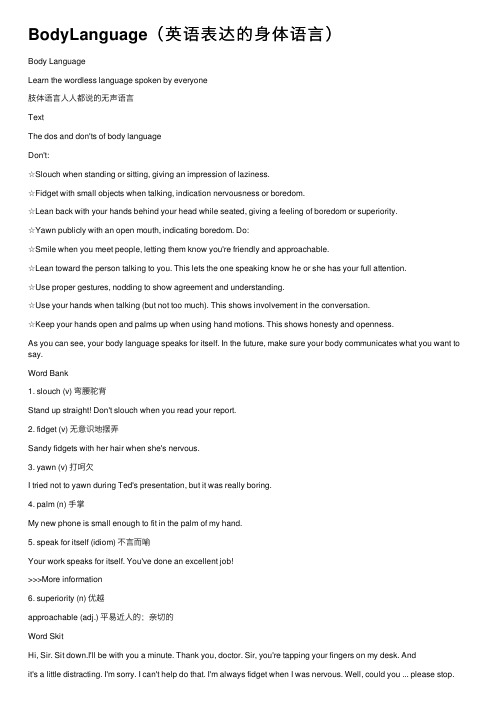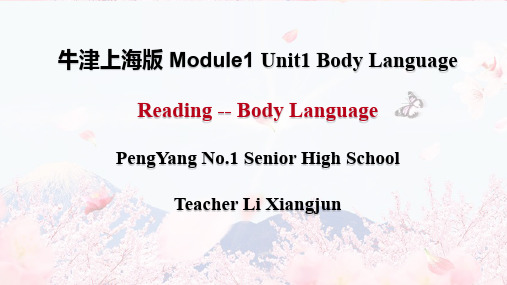沪版牛津英语教材第一单元bodylanguage12
牛津沪教版英语五年级上册Unit1-Unit12全册课件-含教案

欢
迎
下
载
同步习题
提示:双击打开后可根据需要进行编辑,打印,保存。
欢
迎
下
载
Module 1 Getting to know each other
1
Unit 1 My future
Ask and answer
What do your parents do? What can you do? What do you like doing?
Kitty comes to school on foot too. Peter comes to school by bus.
How does Joe come to school? Why? How does Alice come to school? Why? How does Kitty come to school? How does Peter come to school?
Peter is a brave boy. He wants to be a __p__ilo__t _ in the future. He wants to __f_ly____ his plane to other countries like the US and Canada. Kitty is a kind girl. She wants to be a __d_o_c_to_r__. She wants to __h_e_l_p__ sick people in the future.
by bus on foot on foot by bus
Going to school
Jill, Joe, Alice, Kitty and Peter are _c_l_a_s_s_m__a_t_e_s__. They are talking about how they come to _s__c_h_o_o__l _.
牛津沪教版英语六上Unit1-Unit12全册课件-附教学设计

y
easy very happy
1. 课后的练习题 2. 用本节课所学的单词和句型向别人介绍 你的同桌或者你的朋友
Module 1 Getting to know each other
Unit 2 My summer
holiday
famous
countryside
everyone
during spend
How was your holiday?
great gym brother
museum\ classmatபைடு நூலகம்s
library\ family
用学到的句型与家人、 朋友谈论假期过得如何。
Module 1 Getting to know each other
Unit 3 Healthy or unhealthy?
Yes, I did. I played chess with him in my home.
Did you go to beach last weekend? …
… Yes, I did.
用学到的句型与家人、 朋友交谈。
5 Unit 5 Animals in danger
What’s your favourite animal?
That’s healthy.
A: What did you have for breakfast this morning? B: I had... A: That’s healthy.\ That’s not healthy. You should...
A
What did you have for breakfast this morning?
I had one hamburger and some cola.
牛津上海英语高一第一学期Unit 1(共22张PPT)

Roll one’s eyes and turn one’s head away
frown
With cultural differences between people, people from different countries greet in different ways.
• The Japanese will ___b__o_w________ when they meet.
The Arabs prefer to ____k_i_s_s__o_n__t_h_e__n__o_s_e__ when they meet..
Many people from different countries will ______s_h__a_k_e_ hands on formal occasions.
5.standing at _a_l_itt_le_d_i_st_a_n_ce_ _w_it_h_o_p_en__ha_n_d_s
Scanning: 1. the function of a smile
show happiness
put people at ease
Scanning:2. the feelings a smile can show / when to smile
feelings
Sub-topic:Para 2
Para 3
Para 4
Para 5
Para 6
to show __h_a_pp_i_ne_s_s
to show
u_n_h_a_p_pi_n_es_s___ _a_n_g_e_r _
to show _A_. _a_gr_e_e_m_ent
_B_.d_i_sa_g_re_e_m_ent
BodyLanguage(英语表达的身体语言)

BodyLanguage(英语表达的⾝体语⾔)Body LanguageLearn the wordless language spoken by everyone肢体语⾔⼈⼈都说的⽆声语⾔TextThe dos and don'ts of body languageDon't:☆Slouch when standing or sitting, giving an impression of laziness.☆Fidget with small objects when talking, indication nervousness or boredom.☆Lean back with your hands behind your head while seated, giving a feeling of boredom or superiority.☆Yawn publicly with an open mouth, indicating boredom. Do:☆Smile when you meet people, letting them know you're friendly and approachable.☆Lean toward the person talking to you. This lets the one speaking know he or she has your full attention.☆Use proper gestures, nodding to show agreement and understanding.☆Use your hands when talking (but not too much). This shows involvement in the conversation.☆Keep your hands open and palms up when using hand motions. This shows honesty and openness.As you can see, your body language speaks for itself. In the future, make sure your body communicates what you want to say.Word Bank1. slouch (v) 弯腰驼背Stand up straight! Don't slouch when you read your report.2. fidget (v) ⽆意识地摆弄Sandy fidgets with her hair when she's nervous.3. yawn (v) 打呵⽋I tried not to yawn during Ted's presentation, but it was really boring.4. palm (n) ⼿掌My new phone is small enough to fit in the palm of my hand.5. speak for itself (idiom) 不⾔⽽喻Your work speaks for itself. You've done an excellent job!>>>More information6. superiority (n) 优越approachable (adj.) 平易近⼈的;亲切的Word SkitHi, Sir. Sit down.I'll be with you a minute. Thank you, doctor. Sir, you're tapping your fingers on my desk. Andit's a little distracting. I'm sorry. I can't help do that. I'm always fidget when I was nervous. Well, could you ... please stop.Thank you. I'll be with you a minute. Sir,you're fidgeting again. You're fidgeting with your car keys. Oh? Was I fidgeting again? Yes. I always do that when I'm nervous. I just move my body. I like to fidget. Could you please stop? I'll just take those for seconds. So what can I do for you, sir? Doctor, I really need your help. How can I help you? I really can't stop fidgeting. Stop ... No ... Don't fidgeting!Usage TipChat roomdos and don'ts 该为和不为ins and outs 所有细节ups and downs 酸甜苦辣Language Tip1. fidget [v.] 坐⽴不安The children were fidgeting in their seats during class. fidget with something 因⽆聊⽽⽆意识地把玩东西。
牛津沪教版英语六上Unit1-Unit12全册课件-附教案

欢
迎
下
载
同步习题
提示:双击打开后可根据需要进行编辑,打印,保存。
欢
迎
下
载
Unit 1 Growing up
Look at the picture
Look and say
Sally was a baby. She was about two months old. She was small and cute.
She is 14 years old now. She goes to junior high school. She is tall and pretty. Her hair is long.
She was 8 years old. Her hair was long. She was very pretty.
One who fails to reach the Great Wall is not a true man. 不到长城非好汉。
museum
palaces
the Palace Museum
The Palace Museum is the head of the world’s top five palaces. It took 14 years to build. It is very big. It measures 961 meters from north to south and 753 meters from east to west. It has four gates and three famous halls. It is the home of many treasures.
Where did you go? What did you do? How was your summer holiday?
Unit1Bodylanguage

A shory video
Skimming
1.How many people are there in the video? 5
2.Where are Debbie and Simon? At a travel agency.
3.What is the main topic of the story? Body language.
Scanning-rank
a.Mr Young said that body language is important.
4
b.The lady walked over Debbie instto sit up and smile.
7
d.A well-dressed lady entered the travel agency.
5
List the body language between Debbie and Simon.
name
body language
effects
Debbie Simon
sit up and hold head up, look at customers, always smile, turn head or body towards customers, greet cheerfully
What
1.Finish C1 and C2 on P.4. 2.If you were Simon, what would you change yourself?
Thank you!!
language
Body Language is a form of non-verbal communication. It uses movements or positions of our body to show other people what we are thinking or feeling. It includes body movements, facial expressions, gestures, posture, speaking distance and other non-verbal signals.
牛津上海版高中一年级第一学期Unit1Bodylanguage学案
School life in the UKPart one Welcome to the unit& ReadingⅠWordsattend 出席,参加earn 获得,挣的respect(v./n) 尊重,尊敬grade 成绩,等级literature 文学challenging 具有挑战性的lunchtime 午餐时间e-mail (vt.) 发邮件给extra 额外的cooking 做饭drop 放弃woodwork 木工工艺dessert (餐后)甜点article 文章pen-friend 笔友former 先前的recently 近来culture 文化II Phrasesfor free / free of charge 免费pay attention to 注意achieve one’s goal 达到目的on (the / an) average 平均prepare…for 为……作准备make / in preparations for 为……作准备introduce…to 把……介绍给inform sb. of / about sth. 通知某人某事donate…to 把……捐献给at ease with sb. 与某人相处自在low-rise building 低层建筑used to do 过去常常earn / win respect 赢得尊重spend …(in) doing / on + n. 在(做)某事上花费at the beginning (of) 在开始encourage sb. to do 鼓励某人做give up (+ n. / doing) 放弃surf the Internet 网上冲浪as well as 同,和,也on the school field 在学校操场上III Language points1.experiencen. [ U] He is an old teacher with much experience.Experience comes from practice.n. [C] My grandfather likes to tell us about his wonderful experiences in the war time.v. During the war time , my grandfather experienced a hard time .We learn from the past, experience the present and hope for success in the future.He is an experienced teacher. (adj.)be experienced at/in +名词/doing something1) Jenny is experienced at teaching beginners.珍妮在教初学者方面有经验。
上海牛津高一英语教案U1BodyLanguage-Listening,SpeakingandWriting.ppt
Listen and answer the questions.
1.When and where did ballet begin? About four hundred years ago in Western Europe. 2.Which two famous ballets are mentioned in the listening? Swan Lake and Sleeping Beauty.
Unit 1
Identifying descriptive words
Ballet originated in the Italian Renaissance
courts of the 15th century, and was further developed in France, England, and Russia as a concert dance form. Ballet is very hard to achieve and takes much practice to master.
She has short hair.
Describe one person and the others guess who he / sheach group will describe a student in the class, but not mention the person’s name. The other groups should ask questions and try to guess who the person is.
What are descriptive words?
Descriptive words are basically key words and phrases that help paint a clear picture and tell a story about something. Whether you are writing an essay, describing a project or promoting a product, descriptive words are important as it gives a clear message to the readers and listeners.
- 1、下载文档前请自行甄别文档内容的完整性,平台不提供额外的编辑、内容补充、找答案等附加服务。
- 2、"仅部分预览"的文档,不可在线预览部分如存在完整性等问题,可反馈申请退款(可完整预览的文档不适用该条件!)。
- 3、如文档侵犯您的权益,请联系客服反馈,我们会尽快为您处理(人工客服工作时间:9:00-18:30)。
Chapter1.Body languageListening, Speaking, Using English, Writing一、章节分析(Section Analysis )(一)综述本章节是语言运用部分。
通过听,说,写方面的训练,提高学生语言词汇方面的能力,加强他们运用语言知识来表达思想感情的能力。
针对高一新生情况using language 的任务是培养学生如何正确有效的使用字典,为以后的学习打下基础。
(二)目标Listening1帮助学生通过抓关键词培养其听力理解能力。
2听说结合,提高听力教学效果。
Speaking1帮助学生运用本课关于肢体语言信息,培养他们良好的礼议。
2鼓励学生在此过程中动脑动口,学会推荐自己及如何评价他人。
Using English1帮助学生如何有效的使用字典。
2培养学生自习自研能力。
Writing1了解书信式“提醒单(reminder )”和邀请信的写作思路。
2掌握写作方法。
3根据简要提示写出符合要求的reminder as well as 邀请信。
(三)重点和难点Listening培养学生抓关键词汇:adj /adv attentively; politely; serious ,nervousn art; steps; movements; sages; points messagesv danceSpeaking通过表演掌握如何推荐自己以及如何评价他人,同时能运用Do’s 和Don’s 句型。
Using English了解字典中不同符号的含义以及如何能有效地运用字典,培养自学能力。
Writing根据提示写出符合要求的short messages 并能采用生生互评。
二、教学设计(Teaching Designs)Listening and speaking1Pre-speaking ---Warming upA short competition :Divide the class into two. Students are asked to answer thequestion: How should a person do during the interview ? Each side should follow the different patterns: Side A is required to begin with “He should…” , while Side B is required to begin with “ He shouldn’t …”Students take turns to answer the question. The side which goes to the last is the winner. (The content cannot be repeated )Example:Side A S1 : He should be polite .Side B S2 : He shouldn’t enter without knocking at th e door.Side A S2: He should sit straight .Side B S2: He shouldn’t brush his hair while answering the questions.教师先请两位学生示范,然后全班分两方进行比赛。
这样可以调动学生学习积极性,鼓励学生多动脑动口。
2Speaking-up1)Dos & Don’ts : After the competition, the students from each side pick out fiv etips on interviews which they think the most important . Ask them to list themon the blackboard in the following form.Two students will be chosen from your school to be exchange students . So twointerviewers are interviewing them to see whether they are qualified or not.Useful expressions for interviewerswhy do you want to be an exchange student ?What do you usually do in your spare time ?What do you think is the most important quality for an exchange student ?Useful expressions for applicantsI’d like to …I usually do… in my spare time.An exchange student must be polite /helpful/ adaptable.3)Make some comments on their performance especially their body language. Step Two ListeningTask One Listening on page 201Pre-listening1)Get familiar with the form of Do’s and Don’ts after speaking .2)Introduce the task to the students, that is , to recognize the key wordsespecially some adjectives and adverbs .3)Study some new words .Ask students to read the definition of eachword and then guess the meaning of it. New words: rush in ; sideways;attentively; stretch .2While listeningListen to the passage and write down as many notes as possible with books closed.Ask students to focus on some descriptive words such as adjective and adverbs.Open books and listen to the passage again, checking the key words.3Post-listeningAfter the listening , help students understand body language sometimes communicate more than words. Body language is quite common in our daily life .Meanwhile , even some artists turn to body language to communicate their ideas and opinions to the public .Introduce the second listening on page 5Task Two Listening on Page 51Pre-reading1)What do you know about Ballet ?教师请学生就他们所知的有关Ballet 的情况谈谈。
教师也可以根据情况作简单的介绍。
2)Introduce the task to students : recognize key words.教师帮助学生明确在对事物进行描述时,名词和动词往往起很大的作用,因此在听的过程中对这些词汇要多加注意,学会辨别关键词汇。
2While-listening1)Listen to the first paragraph with books closed and then repeat the sentencesafter the tape. Ask students to pick out the key words in it.2)Listen to the second paragraph and supply the missing words .Ask students totell the main idea of this paragraph .3)Listen to the last two paragraphs and supply the missing words.3Post –listening听后活动---说的训练。
假设在你班级有一位同学从四岁开始练习Ballet ,在全国和上海的各种比赛中获得很好的成绩. Make a dialogue between you and your classmates about Ballet and her experience of practicing it.通过听的练习,学生对该内容有了一定的了解,便可以在听的基础上围绕听的材料进行说的训练以巩固听的效果。
[链接2]Step One Pre-writing --- to introduce the rules of writing short messages.1Students are required to read the directions on page 15 and answer the following questions .Who do we often write short messages to ?Why do we write short messages ?In what way should we give the messages?In what way should we end the messages ?Do you have to sign your name as well as the date at the end of the message ?In what style are the message written ?2Students are required to know the names of the six parts in the message.Greeting: start with a greetingTopic: mention the purpose of writing (usually in the first sentence )Message: give the rest of the messageRegards: end with a friendly word or phrase.Signature: sign your nameDate : give the exact time3Students are required to read the reminder on page 16 and name the different parts of the message.4Students are required to summarize the rules of writing the short messages .在Short messages中往往要首先由问候语,在正文要写明目的,如果涉及时间,地点的话,要有明确的信息。
